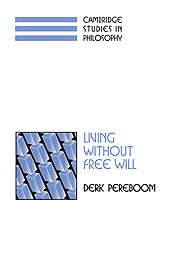Book contents
- Frontmatter
- Contents
- Acknowledgments
- Introduction: Hard incompatibilism
- 1 Alternative possibilities and causal histories
- 2 Coherence objections to libertarianism
- 3 Empirical objections to agent-causal libertarianism
- 4 Problems for compatibilism
- 5 The contours of hard incompatibilism
- 6 Hard incompatibilism and criminal behavior
- 7 Hard incompatibilism and meaning in life
- Bibliography
- Index
7 - Hard incompatibilism and meaning in life
Published online by Cambridge University Press: 23 July 2009
- Frontmatter
- Contents
- Acknowledgments
- Introduction: Hard incompatibilism
- 1 Alternative possibilities and causal histories
- 2 Coherence objections to libertarianism
- 3 Empirical objections to agent-causal libertarianism
- 4 Problems for compatibilism
- 5 The contours of hard incompatibilism
- 6 Hard incompatibilism and criminal behavior
- 7 Hard incompatibilism and meaning in life
- Bibliography
- Index
Summary
INTRODUCTION
When people are first confronted with hard determinism, initial reactions are often apprehensive. Frequently, the first response is that lives would then have no purpose, and a dispirited resignation to one's fate would be inevitable. Indeed, philosophical critics have contended that if hard determinism were true, we would lack the sort of control over our lives that would allow us to derive fulfillment from the projects we pursue. The power to affect our futures would not be ours in a sense sufficiently strong for our projects to count as our achievements, and as a result the possibility of meaning in life would be jeopardized.
Another common first response to hard determinism is that it would endanger the rich emotional texture of our relationships with others. We have seen that P.F. Strawson has developed a philosophical elaboration of this reaction. For him, a hard determinist conviction would imperil the other-directed reactive attitudes essential to the interpersonal relationships that make our lives meaningful. It could also jeopardize self-directed attitudes such as guilt and repentance, crucial not only to good relationships with others but also to personal moral development.
Philosophers have also contended that determinism can make a significant contribution to meaning in life. The Stoics argued that affirming determinism while taking a broader perspective can result in a profound sort of equanimity.
- Type
- Chapter
- Information
- Living without Free Will , pp. 187 - 214Publisher: Cambridge University PressPrint publication year: 2001



